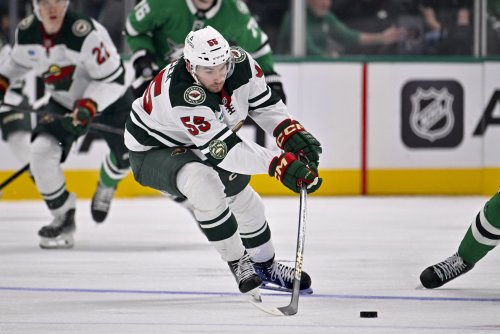
With the fewest minutes short-handed in the league, you'd think Minnesota would have a better penalty kill than they do. But just ask a couple of Hockey Wilderness writers what their opinion of the PK is.
mntrumpterguy
It's been bad all year, but lately I think Duby's sv% has been like .609.
TonyWiseau
Haula took a big step back statistically.
bjvcampbell
Personnel. Jarrett Stoll is not good and got a lot of minutes. No Parise, Fonzy scratched a bunch. Porter good early, but regressed. No Zucker, no Nino.
I hate to say it, but Brodziak is missed.
Duby also struggling on low danger sv%. Lots of shots from far out screened or deflected.
jvanthomme
Dubnyk has gotten more goalie scouting attention this year than previously, due to his unchallenged #1 status on the team. In 5v5 it's hard for teams to devote the extra man to the screen. In 5v4 that's much more possible. The team is over compensating for that by clogging the shooting lanes, which screens Dub, produces more tips, and opens up half wall one-timers.
2 Broke Units
Here's the play in action:
It's plays like this that makes a penalty kill the 3rd worst in the league in Fenwick Against per 60. The Wild is just not blocking shots.
Here's that play:
Not being able to clear the puck is one of my biggest grievances. The PK should be able to get the puck and get a clear. A player only occupies a two and a half foot radius on the ice that's between six and seven feet tall with a range of six feet in any direction. With the entire 85 foot width if the ice, and the tall glass to use at its disposal, getting a clear shouldn't be as difficult as the Wild seem to make it look.
He has no one around him within five feet. But instead of settling the puck down, turning and firing the puck down the length of the ice, he hurries the clearing attempt. In one motion, he tries clearing up the boards. Mikko partially fanned on it, and the zone clear was blocked at the blue line, keeping tired penalty killers on the ice longer.
Tired players lead to goals against...period. We see it on 3-on-3. We see it 5-on-5, and it really takes a toll when a team isn't at full strength.The Wild is 3rd worst in Goals Against per 60 when down a man. Extended shifts don't help that.
Penalty killing requires four main things:
Breaks in the Levee
I would be remiss if I didn't mention Devan Dubnyk's role in the floundering penalty kill. As the old saying goes, "Your goalie needs to be your best penalty killer." As the last line of defense in a clear player strength disadvantage, the goaltender must make some key saves. The penalty killers can do just about everything right, but there is going to be a shot on goal at some point. And it will likely come from someone that is unguarded, as what happened with the Iginla goal, or with traffic in front meaning the goalie will not always see the puck when it is shot.
When the Wild had the league's best PK last season, make no mistake that Dubnyk had plenty to do with it. Dubnyk had a 92.81% save percentage...while short-handed after he joined Minnesota. Most goalies would love to have that kind of save percentage in all situations for an entire year. When you take a deeper dive, Dubnyk was also stopping all the shots he should have been. With a 97% save percentage on just low-danger shots, you can see how difficult he made it for other teams to score.
This season has seen quite the dip in short-handed save percentage. Of the goalies this season with more than 200 short-handed minutes, Dubnyk has the 3rd lowest save percentage in the league at 84.2 percent. He is also the second worst in the league in save percentage on low-danger shots with 89.16 percent. That is quite the drop off from the 97% percent he posted last season. Dubnyk simply isn't stopping the shots that he should be stopping. While overall, Dubnyk is having a good, though not great, season (which was to be expected), being able to stand tall in net would go a long way to fostering confidence for the penalty killers in front of him.
The Wild coaching staff needs to go back to the drawing board when it comes to the penalty kill. Break it down piece by piece, and you can see a need for change of personnel, systems, and an attention to the finer details. Penalty killing, like most defending, requires effort and tenacity. However, miscues can go a long way to derailing that effort. After seeing the numbers and the on-ice play bare it out, no one should be surprised with the results. Bad process equals bad results. For the Wild to go from first to worst in just under a calendar year, something has clearly gone a-miss. The system is clearly broken.
Think you could write a story like this? Hockey Wilderness wants you to develop your voice, find an audience, and we'll pay you to do it. Just fill out this form.





.thumb.jpg.acd5dedd7251543624c6b47bfa6a1212.jpg)

Recommended Comments
There are no comments to display.
Join the conversation
You can post now and register later. If you have an account, sign in now to post with your account.
Note: Your post will require moderator approval before it will be visible.